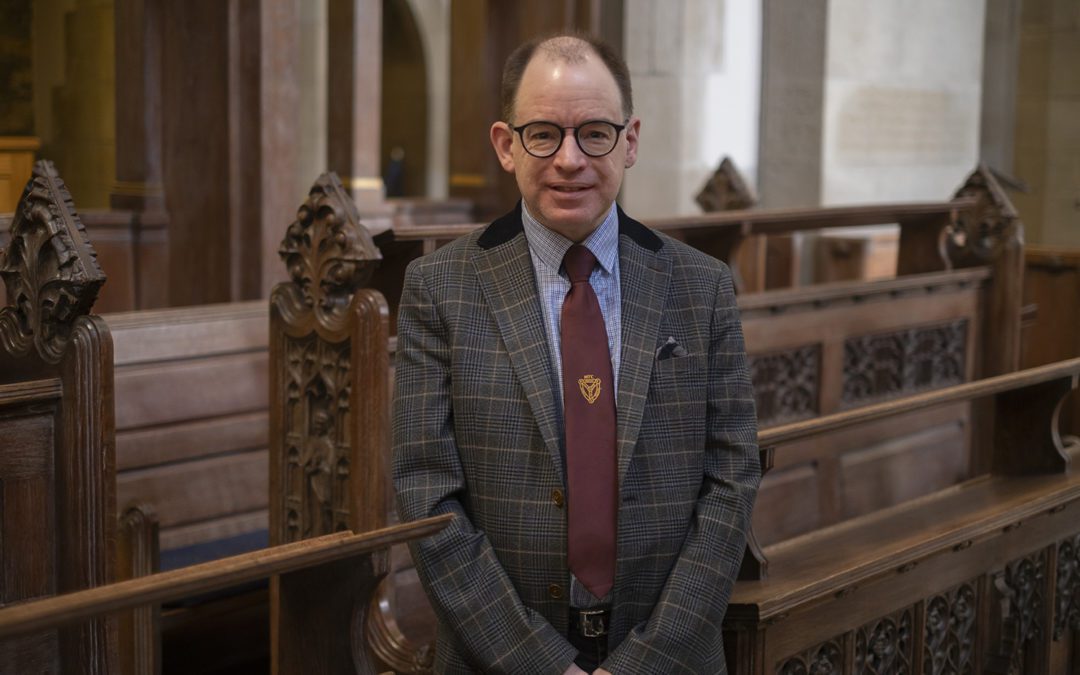On Wednesday 5th February we welcome John Hosking from Blackburn Cathedral for the fourth recital of 2025. In this edition of ‘Notes from an Organist’ we discover more about them, and what to expect from their recital, including playing on the BBC for the 100th anniversary celebration of religious broadcasting; playing a piece written by our new Assistant Director of Music; and why Bradford Cathedral’s organ is one of his favourites.
Could you introduce yourself, how you got into music / become an organist and your musical journey to where you are today?
My introduction to the organ came as a result of growing up in the Methodist church and often accompanying my maternal Grandfather when he led services in his role as a local preacher. I would always ask to have a look at the organ at the end of the service and at about 7 years old, one brave organist offered me a go on the instrument. It was from this point I was hooked. I played for my first service at the age of 8, which was led by my father who was also a local preacher. I was also fortunate that the organist of our family chapel was a very accomplished player, and it was from his playing that I learned how to colour verses of hymns and psalms.
What can people expect from your recital at Bradford Cathedral?
People can expect plenty of contrast, some familiar tunes manipulated cleverly into fine arrangements and to hear the full tonal range of the Bradford organ, which is one of my favourite cathedral instruments.
Why do you enjoy playing the organ?
I love the contrasts of colour one can get out of a good instrument along with its vast dynamic range.
Do you have a particular favourite piece out of those you are playing?
I tend to be rather selfish and only play music I really like in recitals, but if I were to choose a favourite in this programme it would be Dan Miller’s arrangement of “Great is thy faithfulness”. It’s a little cheesy, but incredibly effective and allows the audience to latch onto a familiar melody whilst being introduced to a wide range of colour on the instrument.
This season’s theme is ‘Music in Times of War’. How are you reflecting this in your programme?
The very opening work by Stanford was written in response to the bombing of Rheims in World War 1. Stanford was deeply affected by this and the whole sonata is a tribute to the French people.
You last played a recital at the Cathedral in November 2022. What have you been up to musically since then?
I seem to have dominated the BBC broadcasting scene quite heavily in that time with live broadcasts on Radio 3, Radio 4, BBC1 (twice) and several pre-recorded broadcasts. It was an honour to play César Franck’s Choral in A minor on Radio 3 as part of their Franck bicentenary series.
I was also privileged to play for the 100th anniversary celebration of religious broadcasting from St. Martin-in-the-Fields with all the top people from the BBC present, including the Director General. I’ve introduced two new recital series at Blackburn Cathedral on top of our popular Wednesday lunchtime series as well as our series of composition competitions and written two new mass settings for the Cathedral Choir and Cathedral Youth Choir.
You are also a composer; for you, what makes an interesting composition?
I prefer to write choral music over organ music and for me, an important part of this process is making the text come alive. I like to see how people word paint and if there is an organ accompaniment, to see how this interacts with the voices as well as the text.
In late 2024 you played a live concert performance of the joint winning entry of the Advent composition competition, a piece by our Assistant Director of Music William Campbell. Why did you pick that piece, and what was it like to perform it?
William’s piece was very well crafted with a wonderfully arched shape to it, beginning and ending very quietly (and mysteriously), building to an enormous climax at just the right time. William met our brief admirably and had obviously envisaged the occasion at which it would be performed. Many people commented how moved they were by this work and I felt privileged to be the first person to introduce it to an audience.
You also returned to play at St. Asaph Cathedral after five years away; what was that like to be back?
The organ had recently had some work done to it following water damage and in my role as Diocesan Organ Advisor wanted to see how it was sounding after the work had been completed. It was lovely to sit back at the console I’d presided over for 14 years and conjure up some familiar sounds.
What are your hopes or plans musically for 2025?
I’m looking forward to wrapping up our series of composition competitions at Blackburn Cathedral which has aimed to produce new, accessible music for major points in the church’s year. We plan to publish the best of these submissions in time for the Cathedral’s centenary in 2026. I’ve got an unusually high number of recital bookings in 2025 as well, and am looking to travelling around the country to play some organs for the first time.
Finally, how would you sum up your upcoming recital at Bradford Cathedral?
Contrasted, colourful, lively, contemplative and a combination of the familiar with works I’m sure some people won’t have heard before.
You can join us on Wednesday 5th February at 1pm to hear John’s organ recital, with an optional £4 buffet lunch beforehand at 12:30pm. You can find out more about John on his website or Facebook page,
You can discover more about our organ recital season on our dedicated page.

